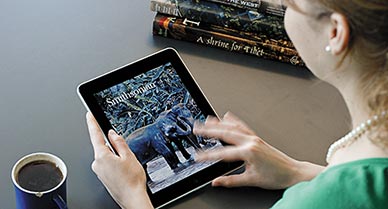A New Way of Reading
[Translations: Japanese]
I have a piece in the August 2010 issue of the Smithsonian magazine, their 40th Anniversary issue. They commissioned 40 views of the future. I wrote about the future of reading, or what they titled Reading in a Whole New Way
 .
.
An excerpt:
And it demands more than our eyes. The most physically active we may get while reading a book is to flip the pages or dog-ear a corner. But screens engage our bodies. Touch screens respond to the ceaseless caress of our fingers. Sensors in game consoles such as the Nintendo Wii track our hands and arms. We interact with what we see. Soon enough, screens will follow our eyes to perceive where we gaze. A screen will know what we are paying attention to and for how long. In the futuristic movie Minority Report (2002), the character played by Tom Cruise stands in front of a wraparound screen and hunts through vast archives of information with the gestures of a symphony conductor. Reading becomes almost athletic. Just as it seemed weird five centuries ago to see someone read silently, in the future it will seem weird to read without moving your body.
Books were good at developing a contemplative mind. Screens encourage more utilitarian thinking. A new idea or unfamiliar fact will provoke a reflex to do something: to research the term, to query your screen “friends” for their opinions, to find alternative views, to create a bookmark, to interact with or tweet the thing rather than simply contemplate it. Book reading strengthened our analytical skills, encouraging us to pursue an observation all the way down to the footnote. Screen reading encourages rapid pattern-making, associating this idea with another, equipping us to deal with the thousands of new thoughts expressed every day. The screen rewards, and nurtures, thinking in real time. We review a movie while we watch it, we come up with an obscure fact in the middle of an argument, we read the owner’s manual of a gadget we spy in a store before we purchase it rather than after we get home and discover that it can’t do what we need it to do.


